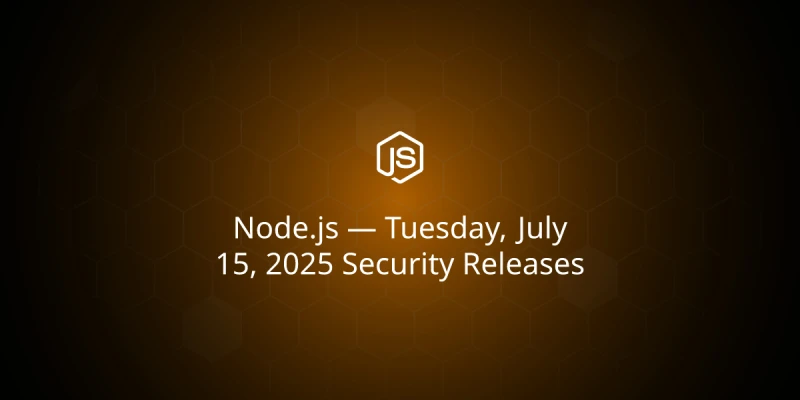🚨 Node.js July 2025 Security Releases: What Developers Need to Know
Critical updates for Node.js v20.x, v22.x, and v24.x are rolling out to address high-severity vulnerabilities. Learn what’s changing and why upgrading is essential.
The Node.js team has issued important security patches across active LTS and current branches, targeting serious vulnerabilities that could compromise application integrity.
📦 Affected Versions & Fix Summary
- Node.js v24.x (Current) — Fixes 2 high-severity vulnerabilities
- Node.js v22.x (Active LTS) — Fixes 1 high-severity issue
- Node.js v20.x (Maintenance LTS) — Fixes 1 high-severity vulnerability
These security issues may involve unsafe memory access, cryptographic misconfigurations, or improper TLS behavior, which can lead to denial of service, memory leaks, or even remote code execution depending on usage context.
🔐 Why You Must Update Immediately
- Protection from Exploits: Public details about vulnerabilities may become available, increasing exploit risk over time.
- Critical Server-Side Stability: Vulnerabilities could result in runtime crashes or erratic behavior under specific inputs.
- Safe-by-default Mindset: Relying on older builds—even if stable—introduces silent risk if they lack recent patches.
📅 Release Timeline
The updates were made available starting Tuesday, July 15, 2025. Versions can be obtained from the official Node.js downloads page or installed using a version manager like nvm or n.
⚙️ Safe Upgrade Checklist
- 1. Back Up: Export your codebase, dependencies, and any native builds or compiled binaries.
- 2. Test Thoroughly: Run integration and unit tests—focus on areas involving HTTPS, crypto modules, or third-party dependencies.
- 3. Upgrade in Place: Update to the latest patch version of your current major release:
nvm install 24orn install 24 - 4. Monitor in Production: After deployment, check for unusual memory, latency, or crash spikes in logs and metrics.
💻 Example: Automated Upgrade Using nvm
nvm install 24
nvm use 24
node -v # Confirm version
npm rebuild # Rebuild native dependencies
npm test # Re-run your test suite
⛔ What If You’re Still on v18 or Older?
Node.js v18 has moved to maintenance mode and will reach end-of-life soon. If you’re using v16 or earlier, you’re already out of support. These builds do not receive security fixes anymore—making your app potentially exposed to public vulnerabilities.
We recommend migrating to v22 (LTS) for long-term support or adopting v24 (Current) for the latest features and fixes.
🔒 CVE Monitoring & Security Awareness
Keep track of official Node.js security advisories and CVE reports via GitHub or NVD. Set alerts for critical libraries (e.g., http, crypto, vm) if they’re part of your stack.
👥 Team Best Practices
- Set calendar reminders to check Node.js releases monthly.
- Use tools like
snyk,npm audit, ordepcheckto identify insecure dependencies. - Review your build pipelines—automate version checks during CI/CD deployment.
🧾 Quick Summary
- 🚨 Node.js v20.x, v22.x, v24.x – all received critical security patches.
- 📅 Released on or after July 15, 2025.
- ✅ Upgrade ASAP to maintain application integrity and security compliance.
- ⚠️ Older versions are no longer patched—upgrade now to avoid exposure.
Web Expert Solution delivers essential updates, tutorials, and expert insights into JavaScript tooling, Node.js, React, and full-stack development. Subscribe for more breakdowns on security patches, ecosystem changes, and production-ready practices!
